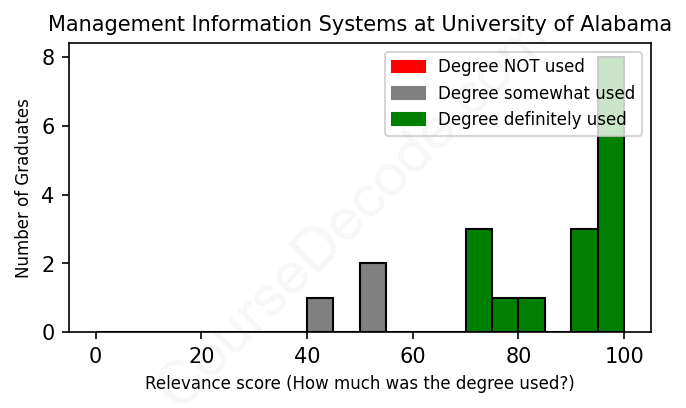
First, some facts. Of the Management Information Systems graduates from University of Alabama we've analyzed , here's how many have used (or NOT used) their degree in their career:

These are estimates based on AI analysis of 19 LinkedIn profiles (see below).
The verdict? Significantly above average. Overall, with an average relevance score of 83%, Management Information Systems graduates from University of Alabama have a much higher likelihood (+16%) of finding work in this field compared to the average graduate across all fields:
And for comparison, here's the chart for all profiles we've looked at across all degrees.
Also, after graduating, only 15% of these graduates have pursued further education other than another Bachelor's degree (such as a Masters degree or other), compared to the average across all profiles of 35%. This suggests a Bachelors degree is enough for most Management Information Systems graduates, and it's normal to look for work straight after graduation.
See the details:
|
Relevance score: 90% We think this person has gone into a career highly relevant to their degree. We think this person has gone into a career highly relevant to their degree.
DEGREE INFOGraduated in 2018 from University of Alabama with a Bachelors Degree of Science in Commerce and Business Adinistration in Management Information Systems. No other secondary education since. JOB HISTORY SINCE GRADUATIONPega Robotic Process Automation Intern Unum Jan 2018 - May 2018 LEAP Tech Associate  BBVA in the USA Jun 2018 - Jan 2019 DevOps Architect  BBVA in the USA Jan 2019 - Oct 2021 Business Process Analyst  PNC Oct 2021 - Present ABOUTI am currently working with BBVA Compass bank in Birmingham, Alabama. I started in June 2018 as a LEAP Tech Associate where I will learn necessary management skills and gain appropriate knowledge in order to be placed within another department in January 2019. My hobbies include playing video games and watching sports and movies. |
The top 10 most common jobs done by the graduates we've analyzed (ranked most common to least) are:
After looking through various LinkedIn profiles of alumni from the University of Alabama who studied Management Information Systems, it seems like the most common job roles people are landing into are related to business analysis, software development, and technology consulting. Many graduates have gone on to positions such as Business Analyst, Software Developer, and Technical Consultant, which allow them to apply the analytical and practical skills they learned during their studies. Positions like the Lead Developer, Business Systems Analyst, and Implementation Consultant are particularly notable since they rely heavily on the principles of Management Information Systems, helping businesses effectively manage and analyze data.
However, not all of these jobs are directly tied to the core curriculum of Management Information Systems. While many roles leverage some transferable skills, such as in project management and data analysis, others—like the Human Resources Specialist and various management positions—focus more on general management activities rather than technical systems management. Overall, it seems that those positions that are most closely linked to software and information technology directly capitalize on the knowledge gained from their degree, while others can sometimes stray away from the core competencies of Management Information Systems. So, while there are definitely many relevant jobs out there, it's clear that the applicability of the degree varies significantly from one position to another.
Here is a visual representation of the most common words in job titles for Management Information Systems graduates (this is across all Management Information Systems graduates we've analyzed, not just those who went to University of Alabama):

It looks like graduates from the Management Information Systems program at the University of Alabama generally have solid career trajectories. Right after graduation, many of them start out in tech-heavy roles that are directly related to their degree. For instance, job titles like Software Developer, Business Analyst, and Data Analyst show that they often jump into positions that leverage their technical skills and knowledge in information systems. This trend doesn’t just stop at entry-level positions; as time goes on, many graduates move into more senior roles such as Senior Consultant, Implementation Manager, and even managerial positions in agile processes or technology operations. This suggests that they build impressive careers in the tech and consulting space over the years.
Now, looking five to ten years after graduation, the trend continues positively with many alumni advancing to roles that imply significant responsibility and expertise. Graduates often transition into management or specialized consultant roles in major companies, including tech giants like Microsoft and SAP, and they delve into areas like cloud solutions, product management, and business transformation. Even those who took a few detours—like starting in roles that seem less directly related to information systems—often find their way back into relevant fields, displaying flexibility and resilience in their career paths. Overall, it seems most graduates are not just surviving but thriving in careers closely tied to their education, making it a worthwhile investment in their futures.
Honestly, the Bachelor’s degree in Management Information Systems (MIS) at the University of Alabama, like many similar programs, falls somewhere in the middle when it comes to difficulty. It’s not a cakewalk—there’s definitely a fair amount of math, programming, and business concepts involved, but most students find it manageable if they stay organized and keep up with the coursework. The material can be technical, so if you enjoy problem-solving and are curious about how technology intersects with business, you’ll likely find it pretty interesting. Overall, it's a solid challenge that requires effort, but it’s not necessarily harder than average if you stay on top of things!
Most commonly, in the LinkedIn profiles we've looked at, it takes people 4 years to finish a Bachelor degree in Management Information Systems.
Alright, so looking at these Management Information Systems grads from the University of Alabama, it seems like they've generally landed some solid gigs, which is good news for their wallets! Many of them have climbed the ladder at well-known companies like Microsoft, SAP, and Southern Company, hinting that they're raking in decent salaries, especially those in more senior roles like "Manager" or "Director." For instance, the folks transitioning from developer roles to senior positions tend to have starting salaries in the high $60k-$80k range, and that just keeps going up as they gain more experience. Plus, those who have taken on consulting roles at major firms likely bag higher pay checks as well. Overall, it's safe to say that most of these graduates are probably doing pretty well for themselves financially!
Here is a visual representation of the most common words seen in the "about" section of LinkedIn profiles who have a Bachelor degree in Management Information Systems (this is across all Management Information Systems graduates we've analyzed, not just those who went to University of Alabama). This may or may not be useful:

Here are all colleges offering a Bachelor degree in Management Information Systems (ordered by the average relevance score of their Management Information Systems graduates, best to worst) where we have analyzed at least 10 of their graduates:
| College | Score | Count |
|---|---|---|
 The University of Alabama The University of Alabama
|
93 | 18 |
 The University of Georgia The University of Georgia
|
84 | 12 |
 University of South Florida University of South Florida
|
83 | 10 |
 University of Alabama University of Alabama
|
83 | 19 |
 San Jose State University San Jose State University
|
79 | 16 |
 University of Maryland Baltimore County University of Maryland Baltimore County
|
79 | 10 |
 University of Georgia - Terry College of Business University of Georgia - Terry College of Business
|
77 | 18 |
 University of Arizona University of Arizona
|
76 | 14 |
 Penn State University Penn State University
|
73 | 11 |
 Ohio University Ohio University
|
73 | 10 |
 Oklahoma State University Oklahoma State University
|
73 | 17 |
 Baylor University Baylor University
|
73 | 12 |
 University of Houston, C.T. Bauer College of Business University of Houston, C.T. Bauer College of Business
|
73 | 20 |
 Texas A&M University Texas A&M University
|
70 | 10 |
 The University of Texas at Austin The University of Texas at Austin
|
68 | 12 |
 University of Houston University of Houston
|
68 | 19 |
 East Carolina University East Carolina University
|
64 | 11 |
 Washington State University Washington State University
|
64 | 14 |